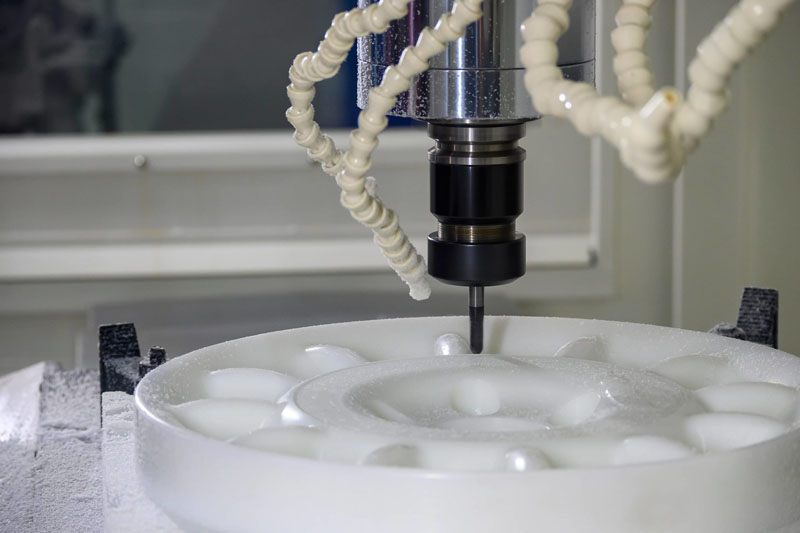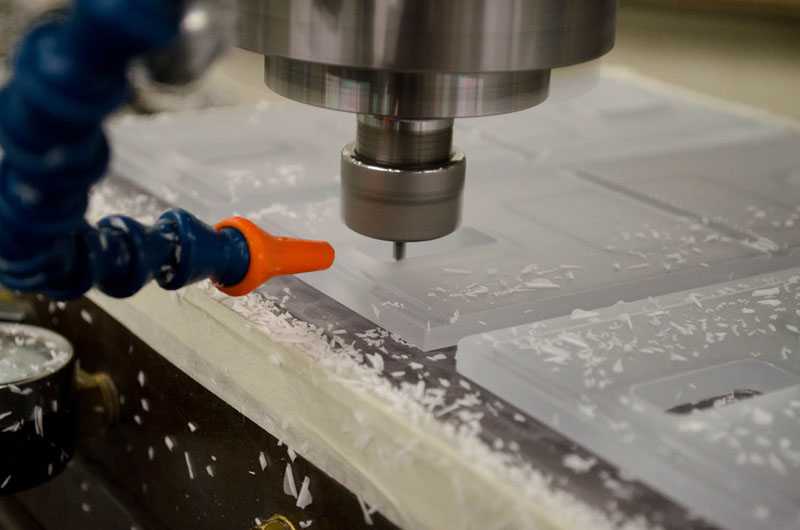Delrin®, also commonly known as acetal (POM) homopolymer, is an impact-resistant and abrasion-resistant semi-crystalline thermoplastic, widely used in various machining applications. Delrin is almost everywhere: high-strength thermoplastics make excellent consumer products and are favored by machinists for their good material properties and high machinability. It is more expensive than commercial polymers, is generally used for high-performance applications and has high processability.
Although opaque in nature, Delrin is available in all colors. It has a density of 1.410–1.420 g/cm3 and a hardness of -40°C. Its crystallinity is 75-85% and its melting point is 175°C.
Delrin is suitable for machining processes such as milling and turning, and provides plates or extruded bars for this purpose. The material can also be cut with a laser cutting machine, and its pellets are used for injection molding and plastic extrusion.
Today we mainly introduce the characteristics of this material and the advantages of CNC machining this material.

Delrin Material Properties
Delrin plastic has unique characteristics that make it one of the commonly used plastic materials for rapid prototyping. Here are some of its important attributes.
Electrical Characteristics
Delrin has excellent insulation properties. Combined with its excellent mechanical strength, Delrin is a very suitable material for electronic components.
Plastics can also withstand large amounts of electrical stress, making them suitable for use as high-voltage insulators. Its low moisture absorption also makes it an excellent material for keeping electronic components dry.
Mechanical Strength
The tensile strength of Delrin is between 7,000 and 9,000 PSI. As a plastic, Delrin has a lower density than metal. Delrin plastic is also unusually hard. This hardness does not mean that Delrin is brittle, because Delrin also has strong toughness.
Delrin is one of the few unusually hard materials that still retains its toughness. Delrin’s high strength-to-weight ratio makes it suitable for parts that need to withstand huge pressure while being lightweight.
Anti-fatigue
Delrin is a very tough material. It can withstand a lot of abuse without fail. Delrin plastic has excellent resistance to fatigue failure in the temperature range of –40° to 80°C. In addition, its anti-fatigue ability is not significantly affected by moisture, chemicals or solvents. This characteristic makes it the material of choice for parts subjected to repeated shocks and stress.
Impact Resistance
It has been found that Delrin plastic can withstand sudden shocks without failing. Compared with other polymers, Delrin polymer has very high toughness. There are processed Delrin grades to provide greater resistance to sudden shocks.
Good Dimensional Stability
Dimensional stability measures the ability of a material to maintain its normal size after being subjected to pressure, temperature, and other conditions during processing.
Therefore, the rapid prototyping of Delrin is possible because it will not deform during processing. Due to this characteristic, processing Delrin is much easier than processing other materials.
Friction Characteristics
Moving machine parts are usually lubricated to reduce the friction generated when they rub against each other. However, parts machined with Delrin do not require lubrication because they are inherently slippery. This feature can be used as part of a machine, such as a food processor, where external lubricators may contaminate the product.
Strength
Delrin has high tensile strength and durability, which makes it a suitable material for high stress applications. Delrin is very strong, so it is often used as an alternative to steel and aluminum alloys.
Moisture-proof
Even in the wettest conditions, Delrin can absorb very little water. This means it can maintain its structural integrity even in underwater applications.
Creep Resistance
Delrin is an extremely tough material that can withstand a lot of pressure without failing. This outstanding durability makes it the material of choice for parts in many industries.
Electrical Insulation
Delrin is an excellent insulator. It is used in many electronic products precisely because of this feature.
Advantages Of Machining Delrin
Delrin is a popular engineering thermoplastic used for CNC machining because of its material properties and processability. Its main advantages are:
Machinability:
Delrin is a free-cutting plastic with excellent dimensional stability. This makes it easy to cut to tight tolerances.
Strength, Toughness And Impact Resistance:
Delrin is a tough, high-strength material suitable for demanding applications.
Moisture and chemical resistance: Delrin is resistant to solvents, gasoline, alcohol and other chemicals, as well as moisture.

Creep Resistance:
Delrin has good creep resistance and is suitable for long-life end products such as auto parts. It also provides good fatigue endurance.
Electrical Insulator:
Due to its electrical insulating properties, Delrin is a popular processing material in consumer electronics.
Natural Lubricity:
Delrin has a high level of natural lubricity, so it is ideal for low-friction applications where parts will come into contact with other plastic parts.
Limitations Of Machining Delrin
Delrin machining has some limitations that make it unsuitable for certain parts and applications. Its main limitations and weaknesses are:
Adhesion:
Due to its chemical resistance, Delrin does not respond well to adhesives and is difficult to bond-although Delrin is easier to bond than POM copolymers.
Flammability:
Delrin will not self-extinguish and will burn until the oxygen disappears. Class A fire extinguishers are required to extinguish POM fires.
Heat Sensitivity:
Machining POM at too high temperature will cause deformation. Although this can be managed, it does require attention.


